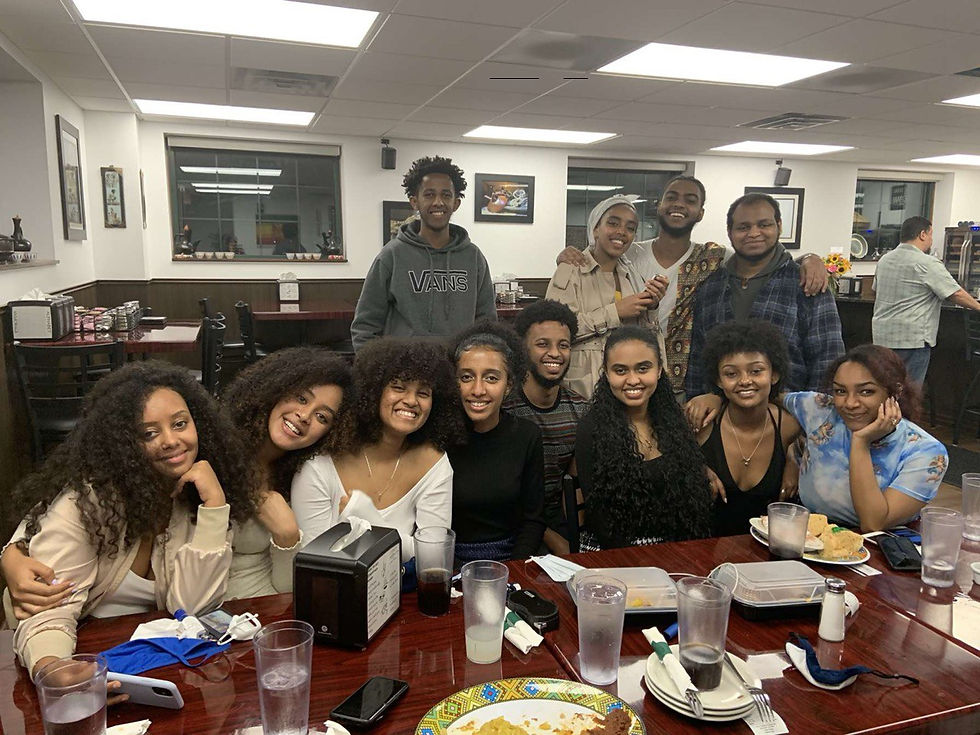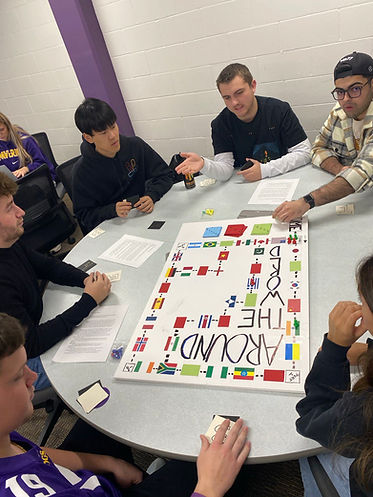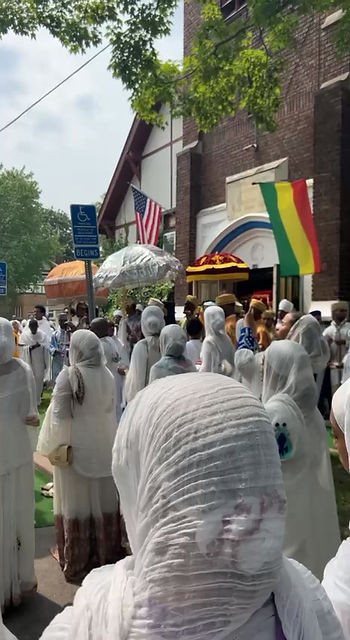Tsion Zewdie

Study Abroad





My perspective as an international student
Moving from Ethiopia to the United States for my undergraduate education was an immense transition full of lessons about my own identity as well as American culture. As an 18-year-old straight out of high school, I had never before left my home country when I relocated to study at a university in Illinois. While this presented significant challenges, my college experiences also gifted me an invaluable intercultural education that profoundly shaped how I view the world.
Those first few months in Chicago were incredibly difficult. I arrived in the dead of winter, feeling isolated and far from home. There were very few international students, and I did not know anyone. I immediately noticed cultural differences that highlighted my foreignness. Americans valued personal space in a way I wasn't used to. Strangers sat awkwardly far apart from each other on the subway. My fellow students insisted on splitting checks at restaurants down to the penny, rather than the communal eating to which I was accustomed. Everything felt rigid and impersonal.
Two months after starting classes, the COVID-19 pandemic hit and everything transitioned online. I lost the in-person college experience for which I had hoped. With no family in the U.S., I felt lost and alone. After that rocky start, I decided to transfer to Minnesota State University. Here I found a much larger Ethiopian student community that provided me with a sense of belonging. Over time, the university has attracted more and more students from Ethiopia. Now it almost feels like I'm back home on a college campus in Addis Ababa! the familiar language, food, and cultural similarities have helped ease the adjustment. It's now rare not to say 'hi' to at least three Ethiopians a day. We call each other for coffee after church on Sundays, and the holidays are no longer spent in my bed watching a movie. I also see people from my community in every department on campus, which motivates me to strive for more. We are all blessed for the opportunity, and we are making it all count. It's amazing to witness every day. However, in the midst of feeling at home with familiar faces and shared experiences, I might be comfortably ensconced within my known circle. The strong bonds and support from fellow Ethiopians have been a lifeline, but it's crucial to balance the comfort of the familiar with the potential for growth beyond it. This realization urges me to explore beyond the confines of what I know and to embrace the broader diversity that undoubtedly exists within the larger campus community. As I continue this journey, I am reminded that growth often requires stepping outside the comfort zone, even when surrounded by a supportive community.
As I built connections, I continued learning about American individualism compared to the more collective culture I grew up with. My American peers seemed loyal first to personal goals rather than community bonds. I remember when I was in middle school a boy from Sierra Leone attended our school for a year and we all tried to talk to him and make him feel comfortable, we even had him sing his national anthem in the morning before we sang ours. As a community, we try to create a space where you don't have to try too much to fit in. But in contrast, it's normal to sit awkwardly with an American and that bothered me at first and thought I was the problem. But it turns out that might be the case with a group of Americans.
Everywhere, I was struck by Americans' punctuality and rule-following. Events started exactly on time, down to the minute, and policies and regulations were strictly obeyed, with no exceptions. In contrast, back home in Ethiopia, time was more flexible and often based on personal relationships. For instance, meetings and events in Ethiopia might start a bit later than scheduled due to social interactions and greetings. This difference in time management and adherence to rules sometimes led to cultural clashes and misunderstandings. It meant that sometimes I could be late to events thinking that they would not start
Transitioning between Ethiopian and U.S. cultural norms presented some real challenges. In Ethiopian culture, we hold deep respect for authority figures and our elders, which contrasts with the more egalitarian approach in the U.S. educational system, where students are encouraged to question and challenge their professors. Adapting to this new classroom dynamic was a significant adjustment for me. Another cultural clash revolved around conflict resolution. In Ethiopia, we tend to address issues indirectly and avoid confrontation, whereas the U.S. places a high value on open and direct communication when dealing with conflicts. To fit in, I had to consciously change my communication style, embracing a more direct approach, even though it was quite different from my cultural upbringing and norms.
But, as I adapted to these cultural differences, I came to admire this systemized order in American society, recognizing the value of punctuality and adherence to rules, which can contribute to efficiency and productivity in various settings.
Beyond bonding with other Ethiopians, my eyes were also opened to race relations in America. Back home in Ethiopia, I grew up proud of my Black identity and heritage. Our nation's history of fighting colonialism instilled deep confidence in who we are. But in the U.S. I noticed many Black Americans seemed to lack this same self-assurance. I witnessed the ways Black people were treated differently by society firsthand. As an African immigrant, I gained a new perspective on racial dynamics in America that were unfamiliar before. Comparing "Africans in America" and "African Americans" requires recognizing the unique historical context that has shaped each group's motivations and perceptions. African Americans have faced centuries of slavery, segregation, and systemic racism that have limited their opportunities and socioeconomic mobility. This history has impacted their reliance on government assistance programs to address historical injustices. In contrast, many Africans in America arrive as immigrants seeking better lives through education and careers, without the same ingrained disadvantages. However, it's important not to perpetuate harmful stereotypes about either group. Promoting cultural awareness and understanding of systemic racism faced by African Americans can foster greater solidarity within the Black diaspora. Recognizing the complexities of their distinct experiences enables more nuanced discussions about supporting and empowering both communities.
While confronting and reassessing my own cultural assumptions, which were shaped by my upbringing in Ethiopia, I also expanded my understanding of the incredible diversity within American culture. Through befriending students from southern states, recent immigrants, and other backgrounds, I realized there was no single homogeneous “American culture.” Each story was unique, despite sharing an American nationality on the surface.
Today, I continue seeking out opportunities to engage across lines of difference, such as volunteering with the local community to help raise money for various cultural groups in time of need and the Ethiopian Orthodox church to provide services and English classes for new immigrants in our community. I also make an effort to participate in workplace diversity training at my job to expand my cross-cultural awareness and communication skills. Or I simply try to have open-minded conversations with people from different backgrounds that challenge my own assumptions. My time immersed in American culture taught me the power of curiosity, empathy, and an open heart to connect beyond borders. Wherever I am, I aim to enter each new encounter with humility and compassion.
As I look toward graduate school, I anticipate new challenges connected to studying abroad and being immersed in different cultural contexts again. This time, I hope to enter with a greater understanding of my own limitations and biases. I know there will be moments of struggle when norms, values, and communication styles may conflict with my own. However, I will remember lessons from my early experiences adjusting to American life. Things that once felt intimidating like culture shock now feels like opportunities for mutual exchange and growth. Interactions with people from different backgrounds will require patience and an openness to learn from their perspectives. By focusing on similarities and listening without judgment, I can turn cultural differences into bridges of understanding. My goal is to approach each new situation with an empathetic heart and mind, turning challenges into opportunities for connection - one interaction at a time.